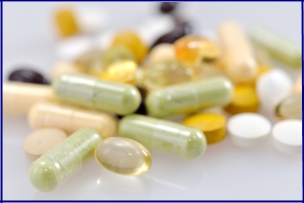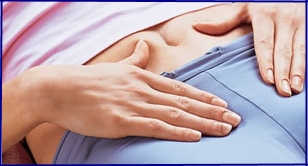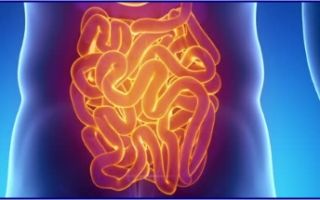Irritable bowel syndrome (IBS) is a functional bowel disease characterized by chronic abdominal pain, discomfort, bloating and abnormal bowel behavior in the absence of any organic cause.

Content
What is irritable bowel?
Doctors and scientists have been dealing with this problem for more than 100 years. It affects a huge number of people all over the world. The prevalence of the disease in the world can be viewed here . Statistics show that most people first encounter this problem at the age of 20-30.
At different times, different diagnoses were made for functional bowel disorders, such as nervous diarrhea, mucous colitis, intestinal dyskinesia and others.
As a unified designation for all such disorders, the international medical community has adopted a single term - “irritable bowel syndrome” (IBS).
This disease is not life-threatening. The term “irritable bowel syndrome” refers to many disorders of the motor-evacuation function of the intestines, in some cases, a violation of the enzymatic function of the small and large intestines.
In order to accurately distinguish between the syndrome and random intestinal disorders, the World Congress of Gastroenterology defined clear criteria for the disease.
This is a functional intestinal disease without organic lesions of the intestinal wall. In this case, recurrent abdominal pain and discomfort appear more than 3 days a month in the last three months, provided that the first signs of discomfort began more than 6 months before seeing a doctor.
This condition must be accompanied by two of the following three signs:
- improvement after defecation
- the onset of discomfort is associated with a change in stool frequency
- the onset of discomfort is associated with a change in the shape and appearance of feces.
There are 3 types of IBS possible:
- diarrhea syndrome
- constipation syndrome
- syndrome with alternating diarrhea and constipation.
Attention should be paid to factors that are highly likely to indicate this syndrome.
- More often the disease develops in young people, 30-40 years old. It can last for years. However, the symptoms do not change. If new symptoms appear, you should pay attention and consult a doctor. In older people, the disease is less likely to occur and with similar symptoms requires careful evaluation.
- Abdominal pain and the urge to defecate occur during a person’s daily activity. If these symptoms occur at night, then most likely this is a different diagnosis and examination is necessary.
- Weight loss and anorexia are not common. This is more likely evidence of psychological problems or organic intestinal damage.
- Functional disorders in the intestines can be caused by other diseases. For example, diabetes mellitus, Addison's disease, hypocortisolism and other endocrine diseases cause intestinal dysfunction. In addition, such disorders can occur with prostatitis and cholecystitis.

Symptoms
The leading symptom is pain in the abdominal cavity. The pain is most often accompanied by constipation (half of the cases). Less commonly, pain occurs with diarrhea or with diarrhea alternating with constipation. A rarer case is pain with normal bowel movements. And it is very rare to have IBS with diarrhea, but without abdominal pain.
Abdominal pain occurs most often in the left iliac region, and can then spread throughout the entire abdomen. It can be of varying intensity from vague, dull, aching, to burning, cutting and even in the form of colic. The type of pain can be either constant or cramping.
Increased pain is most often possible during and before menstruation, after eating, before defecation. After defecation it subsides.
The pain does not occur at night.
With constipation, the stool is hard, in the form of small balls. With diarrhea, the stool is liquid or soft in consistency, small in volume. It is possible that the first formed portion is replaced by liquid feces. With both constipation and diarrhea, mucus may appear. The presence of blood is excluded if there are no concomitant diseases, such as hemorrhoids , sphincteritis, etc.
To more accurately describe the diagnosis, the Bristol Stool Form Scale .
Irritable bowel syndrome is often accompanied by bloating, belching, nausea, and bad taste in the mouth. These are manifestations of concomitant diseases of the digestive system.
IBS often develops in people with an unstable psycho-emotional state. They often suffer from cacerophobia, suspiciousness, and an obsession with health. In this case, symptoms such as fatigue, headaches, weakness, lack of appetite, palpitations, sleep disturbances, sweating, frequent urination and even low-grade fever appear.
Features of IBS with constipation
- Frequency of bowel movements less than twice a week
- Excessive strain during bowel movements
- False urges
- Feeling of incomplete bowel movement
- Hard or “sheep” feces, reduction in its mass
- Lack of blood in stool
- Increased constipation during traumatic life situations
- The personality structure is characterized by stubbornness, increased love of order, and stinginess.
Features of IBS with diarrhea
- Stool frequency 2-4 times a day
- Feces are scanty in volume, liquid, with mucus
- Frequent bowel movements in the morning
- No bowel movements at night
- Feeling of incomplete bowel movement
- The urge to stool is irresistible
- Diarrhea often worsens or appears in situations that cause fear
- In the personality structure, recognition of one’s personality is overly important
Causes
The causes of this disease are so diverse that for a long time they could not be systematized. But research by scientists around the world and discussion of this problem at International conferences have made it possible to identify the main factors leading to IBS:
- acute intestinal infections
- disturbance of intestinal microflora (dysbacteriosis)
- food intolerance
- hard physical labor
- irregular meals
- xerophagy
- systematic suppression of the natural urge to defecate
- working conditions associated with a fixed body position
- long-term conflictual relationships, for example, in the family or at work
- unstable psycho-emotional state
- diseases of various organs of the abdominal cavity and pelvis
- endocrine diseases
- bowel hypersensitivity to distension
- obesity
- side effects of drugs.
Is stress the cause of the syndrome?
Investigating this issue, scientists have found that stressful situations cause changes in intestinal motility, which contributes to the appearance of symptoms similar to IBS. But no relationship between stress and the development of irritable bowel syndrome has been found. Although for those suffering from this disease, stress certainly causes exacerbations.
The hypothesis that the syndrome is characteristic in most cases of persons with psycho-emotional disorders was also not confirmed. Thus, a study of patients who did not complain about IBS, but the syndrome was identified during the examination, showed that among them the number of people with mental disorders corresponds to the average in society.
At the same time, people who themselves repeatedly consult a doctor about irritable bowel disease, in fact, in the majority, suffer from an unstable psyche. Although the functional intestinal disorders identified in them are insignificant, most of them feel unwell and their ability to work is reduced. Such patients are prone to pessimism, they are characterized by anxious-depressive forms of reaction, aggressive hysterical reactions.
The syndrome in such patients is practically untreatable. In these cases, it is necessary to combine gastroenterological treatment methods with the involvement of a psychotherapist or psychologist.
Diagnostics
Making this diagnosis is a long process. It begins with a doctor interviewing the patient. Through a survey, the doctor tries to identify the main symptoms of the disease. But even if all the symptoms fit into the diagnosis scheme, for its accurate diagnosis it is necessary to exclude the presence of other diseases that give the same manifestations in the first stages of their development.
First of all, it is necessary to exclude the presence of intestinal absorption disorders.
In case of malabsorption, the body does not receive additional vitamins and microelements. This leads to peeling skin, brittle nails, and dull hair. Weeping creases may appear in the corners of the lips and near the folds of the nose. The skin of the face becomes grayish, spots are noticeable on the face, arms and legs. The appearance of the tongue changes significantly.
To identify concomitant diseases, it is necessary to do a blood test. X-ray and endoscopic examinations can exclude the presence of diverticula, polyps, tumors, and inflammatory diseases.
Scatological studies and stool analysis make it possible to exclude helminthic and parasitic infestations .
An endoscopy of the stomach and duodenum, as well as an ultrasound of the abdominal organs .
Treatment
After diagnosis, it is recommended to take a number of independent measures before resorting to drug treatment.
First of all, you need to understand your psycho-emotional state. Find ways to increase psychological resilience. Long walks in the fresh air and positive emotions contribute to the normalization of the psycho-emotional state. Reconsider your life values. Try to arrange your life so that it brings you satisfaction, not irritation. If you cannot do this on your own, then contact a psychologist or psychotherapist.
It is necessary to get rid of suspiciousness. Understand that this intestinal disorder does not lead to serious illnesses in the future and can last for many years without progression.
Try to avoid stressful situations.
Get rid of bad eating habits, limit the consumption of alcohol, sweet carbonated drinks, it is advisable to eat evenly throughout the day, do not use mono-diets and fasting, adhere to nutritional recommendations.
Moderate physical activity is indicated, which, in addition to strengthening the abdominal muscles, helps relieve emotional stress and improve the quality of life.
Treatment methods

For a long time, this disease was treated symptomatically. Homeopathic and chemical medications stopped the individual manifestations of the disease, but there was no clear treatment plan.
The treatment regimen was adopted at the International Rome Congress of Gastroenterologists in 2006. Treatment of patients is carried out in two stages:
- initial course of treatment (3-6 weeks)
- basic therapy (1-2 months).
The goal of the initial course is to reduce the manifestation of the most acute symptoms. It is neither possible nor advisable to try to relieve all symptoms with medications. The manifestations of this disease are varied and will require a large number of different medications, and each medication has side effects that can lead to complications.
Therefore, at the first stage, it is important to convince the patient to change his lifestyle, stabilize his psycho-emotional state, and provide nutritional recommendations.
Prescribe the minimum required amount of appropriate medications.
Diet
If you want to get good long-term results in the treatment of irritable bowel syndrome, the first thing you need to do is improve your diet.
Many people don't take it seriously and don't want to put in the effort to determine their diet or don't think it's important to stick to it. And in vain, since a gut-friendly diet and taking bifidobacteria can relieve the unpleasant symptoms of IBS without any drug therapy and without side effects.
Doctors recommend diet No. 3 (for constipation) and No. 4 (for diarrhea) . It is necessary to adhere to a nutritious diet with a normal content of proteins, fats and carbohydrates. Try to avoid fried and baked foods; steam or boil all foods.
Of course, it is impossible to develop a standard diet for everyone. When drawing up a diet, it is necessary to take into account individual intolerance to foods and the individual reaction of the body to foods. To do this, it is recommended to keep a food diary for some time, in which you note everything you eat and drink and the body’s reaction to these foods.
However, there are general rules that must be followed for all people suffering from irritable bowel syndrome.
- Avoid servings that are too large.
- Keep fixed meal times and eat regularly.
- Several small portions of food are better absorbed than three large meals.
- In the evening, the activity of the digestive organs decreases. This must be taken into account and not overload the body with large portions.
- Chew your food thoroughly and take your time while eating.
- Avoid eating on the go or in a hurry.
- Liquid, Liquid, Liquid!
- Experts recommend drinking 1.5 liters per day. Still water or unsweetened herbal teas are best. Too much carbon dioxide is taboo!
- You cannot do without a large amount of fruits and vegetables with a balanced diet. But be careful! Not every intestine can handle too much raw food, especially in the evening. Therefore: in the evening it is better to eat a small amount of salad and give up raw food.
- Avoid foods that cause gas.
- Fiber is very useful. It is necessary for constipation. For diarrhea, individual intolerance should be taken into account. Fiber-rich foods include fruits (for example, apples, raspberries) and dried fruits, vegetables (for example, carrots, broccoli), grains (for example, whole grain bread, oatmeal, oat or wheat bran), legumes (for example, beans, lentils), nuts (eg peanuts, almonds).
You should not drink at the same time as consuming fiber.
In this case, the opposite effect occurs - intestinal blockage. Although legumes contain a lot of fiber, if you are prone to bloating, they should be consumed in small quantities.
Foods to avoid:
- alcohol, coffee,
- products made from white flour (e.g. baguette, buns),
- very hot or very cold foods,
- fatty foods (including hidden fats in sausage, cheese or meat),
- spicy dishes,
- sweets (sugar promotes the growth of harmful microorganisms in the intestines),
- food products that cause increased gas formation (cabbage, onions, legumes, fresh bread),
- carbonated drinks and prepared foods,
- various sweeteners such as sorbitol or xylitol.
Treatment at home.
 There are many things you can do to relieve irritable bowel symptoms at home.
There are many things you can do to relieve irritable bowel symptoms at home.
For example, mild diarrhea can be stopped by eating water-binding foods such as apples and bananas. There are a number of tips to help support IBS treatment at home. And these funds really help.
Medicines
If diet and home remedies fail, then drug therapy is used.
Treatment of IBS with constipation
Preparations containing lactulose have recently become widespread as laxatives. This substance has proven its effectiveness and is used by doctors all over the world.
Lactulose is a fully synthesized substance that increases the volume of feces and helps normalize intestinal microflora. Contained in the preparations Duphalac, Lactulose, Lactofiltrum, etc.
Like any medicine, preparations containing lactulose must be used under medical supervision.
Although this drug has virtually no side effects, there are several aspects that you should pay attention to:
- with long-term use, water-electrolyte metabolism is disrupted, so monitoring with blood tests is required,
- Use with caution in diabetes mellitus,
- when taking the drug, consume a sufficient amount of plant foods and drink plenty of fluids,
- the drug is not prescribed for abdominal pain.
You should start taking the medicine with small doses, gradually increasing it, and stop taking the drug in the same way, gradually reducing the dose.
The dose of lactulose (Duphalac) is selected individually. You should start with 5 ml once a day. If there is no effect, the dose is gradually increased (by 5 ml every 3-4 days) until the desired effect is obtained. Conventionally, the maximum dose can be considered for children under 5 years old 30 ml per day, for children 6-12 years old - 40-50 ml per day, for children over 12 years old and adults - 60 ml per day. The frequency of administration can be 1-2 (less often – 3) times a day. As a rule, the course lasts 1-2 months, and if necessary it can be extended. The drug is discontinued gradually under control of stool frequency and consistency.
Modern medicine recommends avoiding laxatives such as senna, buckthorn, and rhubarb. These drugs act by inhibiting intestinal motility, which, when used in a course, leads to dystrophy of intestinal smooth muscles.
There are a number of less toxic natural remedies that also increase intestinal motility. These include bran, seaweed, flaxseed, and plantain seed.
The main rule when taking laxatives is regularity. To achieve sustainable results, regular use in small doses is indicated. Single doses in large doses can lead to undesirable consequences.
Treatment of IBS with diarrhea
The main means are sorbents and cytomucoprotectors. These include smectite, which is diluted in water or porridge, soup, or other liquid food and used in several doses throughout the day. Course 1-5 days.
Attapulgite also gives a good effect, as it has an astringent property and absorbs allergens. Can also be used for children over 6 years of age.
Often with IBS, the urge to defecate is unpredictable and can occur at any time.
Antidiarrheal medications will help protect yourself from such situations. Calcium carbonate, loperamide and smecta have proven themselves well.

For abdominal pain, antispasmodic drugs are prescribed. These include mebeverine, duspatalin, dicetel, alverine citrate. For flatulence, simethicone reduces gas formation.
Can irritable bowel syndrome be cured?
The results of treatment depend largely on the person himself. On how seriously he takes himself and his health and is ready to give up bad habits and attitudes.
According to statistics, recovery occurs in 30% of patients.
85-90% adapt to some manifestations of the disease and it does not worsen their quality of life.
10% of patients are difficult to treat. These are suspicious people, fixated on their illness, with psychopathy. Their quality of life is noticeably reduced, sometimes to the point of complete loss of ability to work.
Irritable bowel syndrome, as a rule, does not progress; the condition remains satisfactory for many years.
The risk of developing organic lesions in patients with IBS is no higher than in other people.
Prevention of this disease consists of normalizing lifestyle, following a diet, physical activity, and avoiding unnecessary medications.
It is easier not to lead yourself to functional intestinal disorders than to recover from them later.







